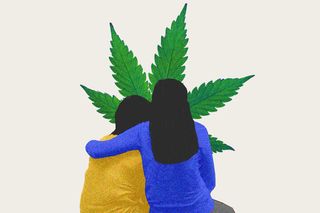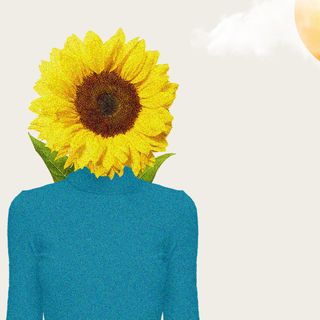
Cannabis Users Are Likely To Be Nicer, More Empathetic: Study
“[Cannabis users] care about human beings in a benign way that, presumably, is a tremendous benefit to society.”

The trope of the kind, friendly stoners may actually hold some truth to it. A new study suggests that cannabis users are more likely to be empathetic, agreeable, and friendly. Oh, and they’re less greedy too.
Published in Scientific Reports, the study found that cannabis use can boost people’s “prosociality,” which was defined by the researchers as “the intentional act of advancing the wellbeing of other people.” Turns out, using the drug led people to experience a shift from being governed by ego-centric notions, to an increased sense of selflessness.
At the same time, as Jacob Miguel Vigil, lead author of the study and assistant professor of psychology at the University of New Mexico (UNM), explained, “[C]annabis users are not necessarily more trusting of other people. It seems as though they do have a sense of responsibility for other people, though, which is kind of nuanced.” Basically, they’re nicer and friendlier without necessarily being pushovers.
The study included 146 participants, described as “healthy young adults” between the ages of 18 to 25. Assessing their “moral foundations” through psychological assessments and questionnaires, the researchers noted that cannabis users had better prosocial scores than non-users.
Related on The Swaddle:
The Cure For Cannabis Dependence … Might Be Cannabis?
This isn’t to say that cannabis users are fundamentally different people, though — in other words, the choice to consume weed itself doesn’t stem from a person inherently being “nicer.” It’s the reaction of the drug with our bodies that makes us so. The participants’ prosociality scores varied based on how recently they can consumed weed. “The transience of the effects supports that cannabis is triggering behavioral and perceptual changes rather than that cannabis users and non-user[s] differ[ing] fundamentally in their baseline approaches to social interactions,” said co-author Sarah Stith, an applied microeconomist at UNM, whose investigates the efficiency and equity effects of healthcare regulations.
Why does cannabis affect people’s behaviors thus? Jan Roberts, psychotherapist and CEO of a medical cannabis education company, who wasn’t involved in the study, has an answer, “Empathy is about connection, and often when people can’t connect to others the limbic system is activated and a fight-or-flight response goes into effect… defenses come up and connection becomes impossible.” Now, what cannabinoids — or compounds found in the cannabis plant — do is they interact with our dopamine system, “lead[ing] to a feeling of being connected… breaking down defenses and that absolutely leads to empathy.”
However, it’s important to not get swept up by the findings and straightaway proceed to consume marijuana. Not only is that illegal in many countries, but as Roberts emphasized, it’s the right combination of the right cannabinoids at the right dosage, that is needed to produce the right effect. Many “right”-s need to fall into place, basically. Moreover, smoking, one of the ways in which marijuana is commonly consumed, is really bad for health, as we know. Mixing it with tobacco, of course, makes it even worse. Further, cannabis can also mess with other medications that one may be on. Unregulated use, therefore — especially that of non-medical marijuana which may be laced with toxic chemicals like pesticides — is a bad idea.
But that doesn’t mean there’s no merit to the study. Reportedly, this is among the first to focus on the non-clinical benefits of cannabis. Vigil noted that research into the impact of cannabis on our brains has “usually been approached by people that view cannabis use as problematic behavior — from addiction researchers and so forth, [who] see cannabis users as unmotivated, or they see them as addicted or, perhaps, believe that they are losing sight of their goals. It’s never really been approached objectively to see what’s going on before making negative interpretations.” And so, through the present study, he sought to reframe how scientists approach the subject in their research.
Related on The Swaddle:
Why Stress Makes the Most Empathetic People Less Kind
Indeed, he succeeded — at least, in terms of proving how our biases color our perception of weed. “We found that folks that had recently used cannabis showed higher levels of pro-social behaviors, and [significantly] higher measurements of empathy… as well as what researchers refer to as ‘moral foundations’… These are basically the types of ideals that we think about when we justify what is right and what is wrong,” he explained, adding, “What my research is suggesting [is] that [cannabis users] care about human beings in a benign way that, presumably, is a tremendous benefit to society.”
It’s ironic, then, that smoking weed, which is perceived by many as a moral “wrong,” might instead push its users to be morally righteous.
However, there’s more to the research than settling the culture-based “right vs. wrong” debate around weed consumption. Vigil hopes that the present findings will inspire medical practitioners to consider replacing opioids with cannabis, wherever possible. Often used as a painkiller, the former doesn’t just include drowsiness, nausea, constipation, and mental confusion as its side effects; besides dulling pain, opiods reduce people’s empathy too, research suggests.
And so, Vigil concludes, “I think that these findings are exciting, because they may just demonstrate an effect of cannabis use that could prove to be even more important than all the disease remedying mechanisms that may even be discovered in the future.”
Devrupa Rakshit is an Associate Editor at The Swaddle. She is a lawyer by education, a poet by accident, a painter by shaukh, and autistic by birth. You can find her on Instagram @devruparakshit.
Related


‘Quality Boredom’ Can Be a Way to Reclaim Our Time
